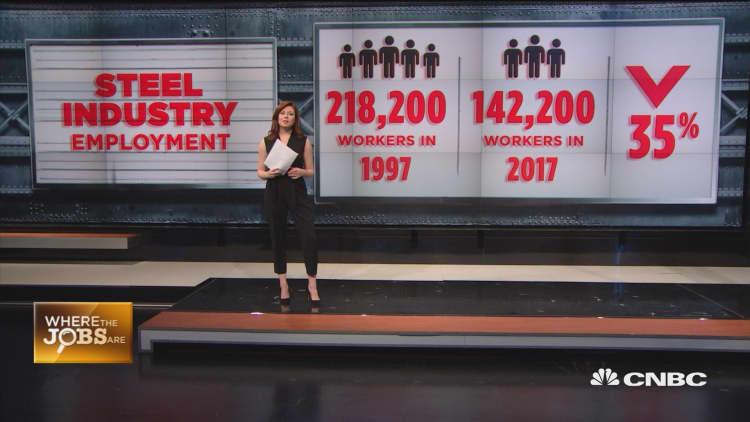
President Donald Trump fulfilled a long-running campaign promise Thursday in levying tariffs on imported steel and aluminum products after a week of build-up to the announcement. The reaction to the move was divided, with major steel and aluminum players expressing support for the move, some promising job creation, while critics said the tariffs would lead to job losses in other industries.
The order places a 25 percent tariff on imported steel and 10 percent tariff on imported aluminum, which will take effect on March 23. Trump has exempted both Canada and Mexico, trading partners in the North American Free Trade Agreement, the decades-old trade agreement that is currently being renegotiated, but it is unclear how long these countries will remain exempted. There will not be any new taxes placed on American-made products.
"We're urging all companies to buy American — that's what we want," Trump said at the order signing. "The action taken today follows a nine-month investigation by the Department of Commerce documenting a growing crisis in our steel and aluminum production that threatens the security of our nation, and also is bad for us economically."
Employment in the steel industry has been declining for two decades, down some 35 percent from 216,400 workers in 1998 to 139,800 in 2016. Between 2015 and 2016 alone more than 14,000 jobs were lost due to plant closings, bankruptcies and more, according to a January 2018 report from the Commerce Department. U.S. Steel and Century Aluminum have both committed to reinvesting in closed plants and hiring workers, 800 in total, as a result of the tariffs, while other major payers, including Alcoa and ArcelorMittal, have expressed their support for Trump's order.
"We've been suffering from a very uneven playing field for more than a decade now, and that has had consequences in many communities across America," said Scott Paul, president of the Alliance for American Manufacturing, a partnership among America's leading manufacturers and the United Steelworkers Union. "We import more steel than any other nation around the world. If we have some balance restored to this market, you will see workers hired back, shifts added and you might even see new investments made in steel mills."
But economists and researchers say that despite gains in steel jobs, losses will be seen in other sectors that will more than cancel out any new job creation. A report from global research firm Trade Partnership Worldwide finds that while some 33,000 jobs will be added within steel and aluminum due to the tariffs, the broader U.S. economy, including manufacturing and energy, will see losses of nearly 180,000 jobs, for a net loss of nearly 146,000 jobs. For every one job created as a result of the tariffs, five will be lost, the report finds. The study does not take into account any retaliation against the tariffs, only the tariffs themselves.
Moody's Analytics Chief Economist Mark Zandi said on Wednesday that the U.S. may lose up to 150,000 jobs if its trade partners were to react with a "proportional response" to the tariffs.
The Precision Metalforming Association, which represents about 800,000 jobs in manufacturing, sees this loss coming to fruition quickly.
"Our members currently are competing with companies around the world in making components, and so we think that the impact would be almost immediately," said Roy Hardy, the association's president. "The costs incurred by the manufacturers of metal components ... go up immediately, and thereby they are less competitive."
He said the jobs added in the metals industry will likely not be permanent. "As you damage the consumers of metal in the United States — the people in the supply chain who purchased the steel and aluminum — in time they would purchase less metals which would lead then to these new created jobs being temporary," Hardy said.
But to counter that, the AAM's Paul points out that companies that may be poised to lay off workers are also benefitting from the GOP's tax overhaul, meaning they should be less inclined to let employees go in the face of higher prices on imported aluminum and steel.
"Our companies are now flush with cash. They just received an enormous tax cut from this Congress, they're operating in a healthy economy with a healthy stock market," Paul said. "I don't think that you will see any real layoffs as a result of tariffs in place."


